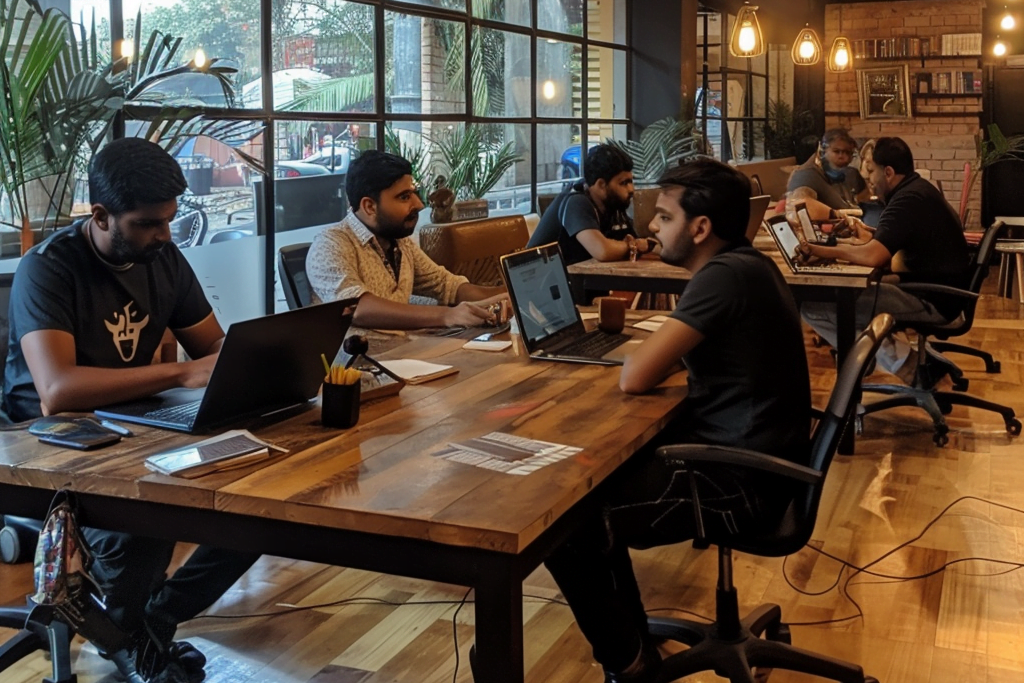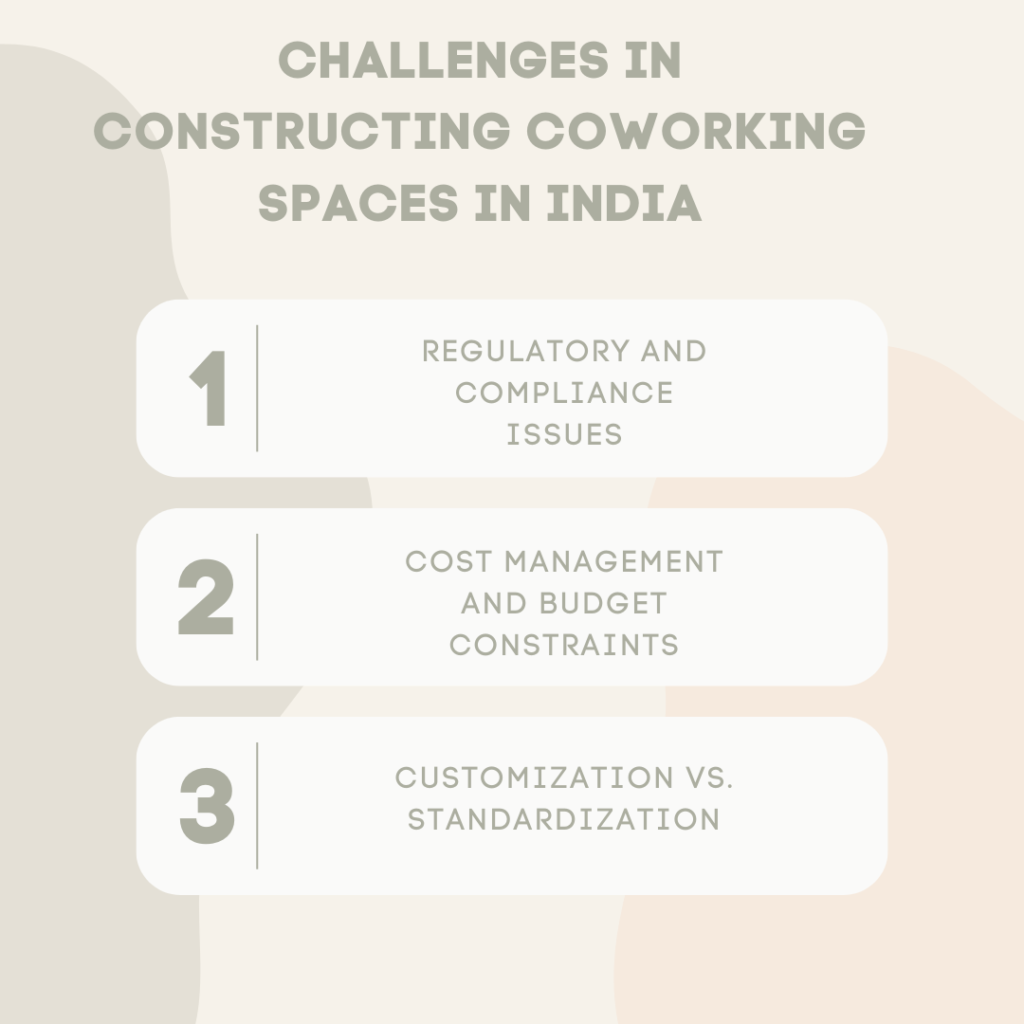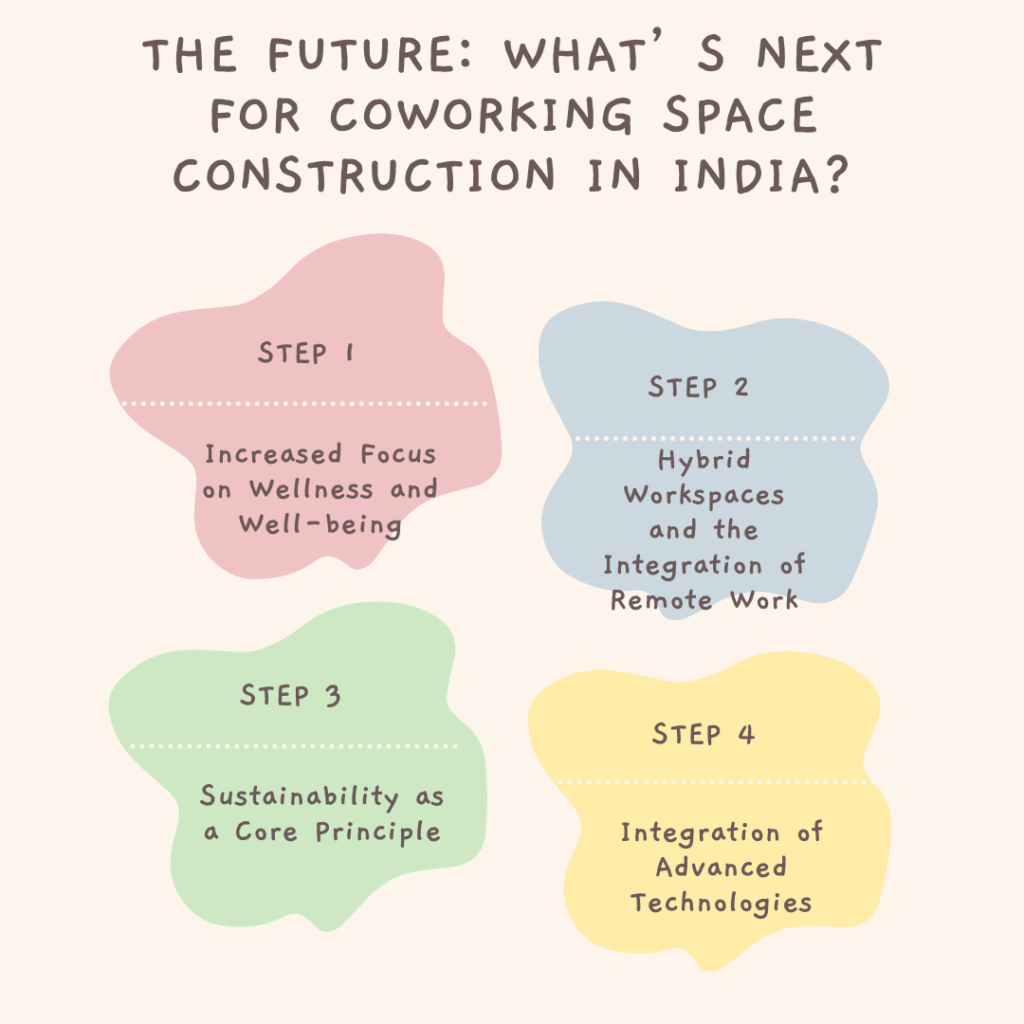Coworking spaces have revolutionized the way businesses operate, particularly in urban environments. With the rise of remote work and a growing demand for flexible office spaces, coworking spaces are more relevant than ever. As we look to the future, the construction of coworking spaces will play a critical role in their development. In India, where urbanization is accelerating, innovative construction solutions are essential to meet the unique demands of this evolving workspace landscape.

The Rise of Coworking in India
India’s coworking market has seen rapid growth in recent years. Driven by a robust startup ecosystem, the rise of freelance and gig economy workers, and companies’ need to reduce operational costs, the demand for flexible office spaces has soared. According to JLL India, the coworking market in India is expected to double its footprint to 30 million square feet by 2025. Major cities like Bangalore, Mumbai, Delhi, Hyderabad, and Pune have become hotspots for coworking spaces, reflecting a significant shift in how businesses operate and manage their workforce.
Innovative Construction Trends Shaping Coworking Spaces
The construction of coworking spaces is not just about creating desks and chairs in a room; it’s about fostering an environment that promotes collaboration, innovation, and productivity. Here are some innovative construction trends shaping the future of coworking spaces in India:

- Adaptive Reuse of Buildings: One of the most sustainable and cost-effective construction trends in coworking is the adaptive reuse of existing buildings. Many coworking spaces are now being developed in repurposed industrial buildings, old factories, and other underutilized properties. This approach not only saves on construction costs but also preserves the architectural heritage of the area. For example, the “Social Offline” coworking space in Bangalore is housed in a repurposed industrial building, which adds character and a unique aesthetic to the space.
- Sustainable and Green Construction: Sustainability is a growing concern in India, and coworking spaces are no exception. Innovative construction solutions include using eco-friendly materials, energy-efficient systems, and water-saving technologies. Green building certifications such as LEED (Leadership in Energy and Environmental Design) are becoming standard for coworking spaces. For instance, the WeWork Galaxy in Bangalore is a LEED-certified coworking space that incorporates green building practices, such as rainwater harvesting and energy-efficient lighting systems.
- Modular and Flexible Design: The future of coworking construction lies in modular and flexible design. With the dynamic nature of businesses and frequent changes in team sizes, coworking spaces must be easily reconfigurable. Modular construction allows for the rapid assembly and disassembly of workspaces, accommodating different business needs. This trend is evident in coworking spaces like Innov8, which uses modular furniture and movable walls to create flexible work environments.
- Smart Building Technologies: The integration of smart building technologies is transforming the construction of coworking spaces. IoT (Internet of Things) devices, automated lighting and climate control, and advanced security systems are becoming standard features. These technologies enhance the user experience and reduce operational costs by optimizing energy usage and improving facility management. For example, Smartworks, one of India’s largest coworking space providers, uses IoT technology to create a seamless experience for its members, from automated check-ins to smart meeting room bookings.
Challenges in Constructing Coworking Spaces in India
While the coworking market in India presents tremendous opportunities, there are several challenges that construction companies must address:

- Regulatory and Compliance Issues: Navigating the regulatory landscape in India can be complex, with multiple approvals required for construction and operation. This can delay projects and increase costs. Additionally, compliance with local building codes and safety standards is crucial for ensuring the longevity and sustainability of coworking spaces.
- Cost Management and Budget Constraints: Construction costs in India can vary significantly depending on location, materials, and labor. For coworking spaces, maintaining a balance between cost and quality is essential. Construction companies must innovate to deliver high-quality spaces within budget constraints, often requiring creative use of materials and design strategies.
- Customization vs. Standardization: While modular and flexible design is a trend, there is a constant tension between customization and standardization. Coworking spaces need to offer unique experiences to attract clients, but too much customization can drive up costs and complicate construction. Finding the right balance is key to successful coworking space development.
Case Studies: Innovative Coworking Spaces in India
To understand the practical application of these innovative construction solutions, let’s look at some successful coworking spaces in India:
- WeWork Galaxy, Bangalore: WeWork Galaxy is a prime example of how innovative construction and design can create a vibrant coworking environment. This space features a rooftop terrace, swimming pool, and wellness room, making it more than just a place to work. The building’s design focuses on sustainability, with energy-efficient lighting, water-saving fixtures, and recycling stations. The space is also designed to be highly flexible, with movable walls and modular furniture that can be reconfigured to suit different needs.
- 91Springboard, Mumbai: 91Springboard is another innovative coworking space in Mumbai that combines sustainability with technology. The space is designed with natural ventilation, reducing the need for air conditioning and lowering energy costs. Additionally, 91Springboard uses IoT devices to monitor and control energy usage, enhancing sustainability. The construction also includes soundproofing solutions to create a quiet, focused environment, demonstrating how coworking spaces can cater to different work styles and preferences.
- Cowrks, Gurgaon: Cowrks Gurgaon is known for its smart use of space and modern construction techniques. The space is designed to maximize natural light, reducing the need for artificial lighting. It also features a variety of workspaces, from private offices to collaborative areas, demonstrating how innovative design can cater to different business needs. Cowrks also integrates advanced security systems and automated climate control, reflecting the growing trend towards smart coworking spaces.
The Future: What’s Next for Coworking Space Construction in India?
The future of coworking space construction in India will be shaped by several key trends:

- Increased Focus on Wellness and Well-being: The importance of employee well-being is increasingly recognized, and future coworking spaces will reflect this shift. Construction designs will focus on creating healthy environments, with features like green spaces, natural lighting, air purification systems, and wellness zones. Incorporating wellness into the workspace will not only enhance productivity but also attract businesses looking for healthier work environments.
- Hybrid Workspaces and the Integration of Remote Work: The rise of hybrid work models, where employees split their time between home and the office, is influencing coworking space design. Future coworking spaces will need to cater to both in-person collaboration and remote work needs. This might include soundproof booths for virtual meetings, high-speed internet infrastructure, and areas designed specifically for video calls and digital collaboration.
- Sustainability as a Core Principle: Sustainability will continue to be a driving force in the construction of coworking spaces. Future developments will likely see an increased use of renewable energy sources, such as solar panels, and sustainable building materials, like recycled steel and bamboo. Additionally, coworking spaces will aim for zero-waste goals, with comprehensive recycling and composting programs
- Integration of Advanced Technologies: As technology continues to evolve, coworking spaces will increasingly integrate advanced technologies to enhance user experience and optimize operations. Augmented reality (AR) and virtual reality (VR) could be used for virtual tours and workspace planning. Blockchain technology might be employed for secure transactions and data management. As artificial intelligence (AI) becomes more sophisticated, it could be used for everything from personalized member experiences to predictive maintenance of the facilities.
The Role of Construction Management Apps like RDash
In the context of construction for coworking spaces, managing the complexities of design, scheduling, budgeting, and execution is critical. This is where construction management apps like RDash come into play. RDash is a construction management company that specializes in streamlining project workflows, enhancing collaboration among stakeholders, and optimizing resource allocation. Through its comprehensive dashboard, RDash allows project managers to track progress in real time, ensuring that coworking space construction projects are completed on time and within budget. By integrating technology with construction practices, RDash helps developers meet the unique needs of coworking spaces, from sustainable construction to smart building technologies, thereby enhancing the overall efficiency and quality of the build.
Conclusion
The construction of coworking spaces in India is evolving rapidly, driven by innovation, sustainability, and the changing needs of the workforce. As coworking becomes an integral part of India’s urban landscape, construction companies must adopt new techniques and technologies to meet these demands. By focusing on adaptive reuse, sustainable building practices, modular design, and smart technologies, the future of coworking in India looks promising.
For businesses, developers, and construction professionals, the opportunity lies in creating spaces that are not only functional and flexible but also sustainable and conducive to a new way of working. The integration of innovative construction solutions, coupled with the use of advanced management tools like Rdash, will be crucial in navigating the challenges and seizing the opportunities in the coworking market. As the demand for coworking continues to grow, those who innovate in construction and management will lead the way in shaping the future of work in India.
By leveraging innovative construction solutions and advanced management tools, coworking spaces in India can continue to evolve, meeting the diverse needs of the modern workforce and contributing to India’s growth as a global business hub.






